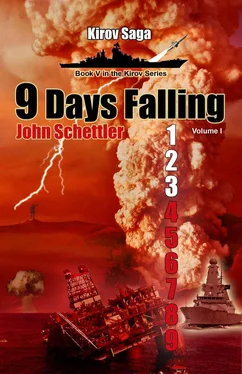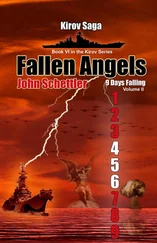“They would have to secure those supplies en-route somehow,” said Volsky. “As an alternative we could take less fuel, put some fighting men on that helo, and secure a small airfield to obtain fuel en-route. It won’t be top grade aviation fuel, but it would work.”
“Very risky,” said Kamenski. “No, I think you had best try to make it in one quick run, and with the bare minimum crew required. The fewer people we leave wandering about in the 1940s, the better. Your Mister Fedorov would certainly agree, yes? Also realize that if this mission fails we will lose those two control rods forever. That may mean nothing, however. We don’t know if these other control rods will even work! They may produce no effects at all.”
“Oh, I believe they will,” said Kapustin.
Kamenski regarded his old friend with surprise. “What makes you so confident in that, Gerasim?”
“Because I told you, I know everything there is to know about these control rods, where they were manufactured, where they were shipped and stored, and one thing more—where the materials used in their manufacture came from…” He let that dangle, a teasing look in his eyes. Now it was his turn to reach in his pocket and pull out the missing piece of the puzzle again, and he took great satisfaction as both Kamenski and Admiral Volsky gave him their full attention.
“This is going to be very interesting,” he said, folding his arms with a smile.
“The time where we are most likely to change is when we are at the edge of the abyss. The moment of our darkest fears, that time each of us must face, is also the instant of our most brilliant clarity.”
~ Kathy Bell,
Regression
“Signalall fleet units to report present status,” Karpov stared at the big Plexiglas screen denoting fleet asset positions, greatly disheartened. The fleet had been rigged for nuclear, biological and chemical warfare conditions, with all hatches battened down, air filters engaged and key personnel on exposed decks outfitted in environmental suits and rebreathers. The first eruption was significant, and commanded their immediate attention, the heat of the air duel further east suddenly seeming insignificant in the face of such awesome natural power.
They had weathered the first shock wave, and some time later a thirty foot tsunami wave rolled the ship heavily, but caused no further damage. Then came the real explosion from the distant Demon on the islands to their north, one that would place it in the record books a notch above the 1815 eruption of Tambora, and the ship took another violent shockwave so intense that Kirov listed fifteen degrees to starboard.
The entire region was soon embroiled in a thick black cloud of pale yellow ash and silt. The falling ash soon become so dense that the morning sun was blotted out and the skies became murky gray deepening to charcoal black in places. The noise of the explosion had abated, but the skies were now scored by lightning and the rumble of thunder. A strong smell of sulfur came with the falling ash, and they encountered squalls of slurry rain. An intense hush seemed to settle over the sea, broken only by the ripple of distant thunder, as if all other sounds had been smothered by the ash fall. Visibility was near zero, their instruments were hopelessly obscured as well.
If not for the sealed citadel bridge environment with conditioned air recirculation and full NBC protocols the crew might have been suffocated in the intensely thickening ash. As it was, the line outside Dr. Zolkin’s sick bay was a long one, and crewmembers that came in reporting respiratory distress were receiving emergency oxygen. Air filters on vital equipment were soon being overwhelmed, and emergency teams were trying to clear them.
Rodenko’s systems initially went dark, then winked on fitfully again and he gave an initial report. They were returning an unreadable signal from the massive ash clouds that had covered the entire area, but in time he began to localize on nearby contacts.
“I think have signal returns on Orlan and Admiral Golovko , sir. No sign of Varyag . This ash cloud is beginning to seriously degrade sensor performance.”
“Communications are spotty,” said Nikolin, “but I’m close enough to raise Orlan ,”
“You mean to say you cannot raise Golovko?” Karpov looked over at Nikolin, unhappy.
“I’m sorry, sir, but I’m getting intense interference all over the band.”
“It’s the ash fall,” said Rodenko. “Byko has a team on the outer deck and reports it is all over the ship. We look like a gray lady wearing a funeral shroud. It’s three inches thick on the main decks, and every system on the superstructure is coated with the stuff. The Chief has men trying to hose down the vital sensors, but it’s difficult work in those NBC suits.”
Karpov walked to the forward view screens where the windshield wipers were smearing the ash back and forth in a blurry mess. Every window was completely coated, just as Rodenko had warned. Then Tasarov perked up, listening to his sonar headset.
“I’m not hearing it any more, sir.”
Karpov turned his head. “Hearing what, Lieutenant?”
“The eruption. I was monitoring it on the passive system with low volume, then it quieted down, so I tuned in to listen. It’s stopped, sir, unless my equipment has also failed. I hear nothing now. In fact my sonic field is completely clear.”
The bridge phone rang and Rodenko reached to answer it. He listened, his eyes registering surprise. “Chief Byko says conditions are clearing, sir. We can secure from NBC conditions and resume normal operations.”
“Clearing?” Karpov found that hard to believe given the size of the eruption they had seen. He was still peering through the muddied view screen, frustrated. “Activate Tin Man One and pan north,” he said, and Nikolin immediately toggled a switch to feed power to the system.
“Getting a picture now, sir.”
The digital feed was spotty, breaking up into checkered squares and reassembling again, but after a moment the image settled down.
“There’s Admiral Golovko,” said Karpov. “But my God, look at the sea conditions! And the sky—Byko was correct. There’s no sign of any disturbance at all.”
A few moments ago they were sailing in the massive ash fall shadow of a VEI Level 7 Ultra-Plinian Super-Colossal volcanic eruption, with tsunami driven seas and ashen skies that blotted out the sun itself, sending them into a limbo of brimstone and pumice—but now they were cruising on quiet seas, with a strange tinge of green fire in the ocean, and pristine white cumulus clouds in an azure blue sky. The distant silhouette of the Kuriles was calm and undisturbed. There was no sign of the eruption at all!
Karpov’s momentary shock soon gave way to instant recognition. “My God,” he said. “Not again…Look at the sea Rodenko. Look at the sky!”
The ship’s Radar Chief and new Starpom was staring up at the screen, dumbfounded. “That eruption was nearly forty kilometers high by my last signal returns. No way you can put that genie back in the bottle, sir. We’ve…”
“We’ve move in time again,” said Karpov. “How is that possible? That reactor control rod isn’t even on the damn ship!” Even as he asked the question he knew the why of it all would likely be a confounding mystery, just as it was the first time this happened. The question he needed to be asking now was not why, but when . That thought went from mind to lips as Karpov removed his hat, wiping the sheen of perspiration from his brow.
Читать дальше












